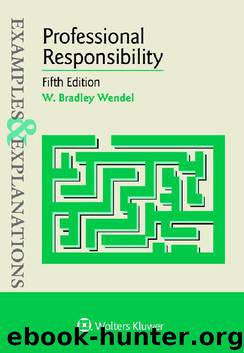Examples & Explanations: Professional Responsibility by W. Bradley Wendel

Author:W. Bradley Wendel [Wendel, W. Bradley]
Language: eng
Format: epub
Publisher: Wolters Kluwer
Published: 2016-01-30T18:30:00+00:00
You are somewhat taken aback by the memo and, being new to the firm, decide to ask someone for guidance. You talk to your assigned “mentor,” a senior associate who enjoys a favorable reputation at the firm. She tells you, “Don’t worry about the memos. They’re protected under the attorney-client privilege and as work product, so there’s no way the defendants are going to find out about them. Besides, there’s nothing wrong with informing your client about the law. That’s all the memo does. Look, our clients aren’t the most sophisticated people in the world. They’re welders, pipefitters, shipyard workers, you know. They’re not too savvy about what goes on in depositions. If we didn’t help them prepare, the defendants’ lawyers would eat them for breakfast. Relax, you’re doing fine.”
You obviously are interested in avoiding trouble with the trial court and the state bar disciplinary authorities. Is there anything improper about giving the memo to the witnesses under the law governing lawyers?
Explanations
Arm-Twisting the Witness
4. This example is based on Resolution Trust Corp. v. Bright, 6 F.3d 336 (5th Cir. 1993), and reviews some concepts discussed in previous chapters. The correct answer is C. The court does have the inherent power to craft sanctions that would respond to misconduct by lawyers in litigation, so D cannot be the right answer. See Rest. §6(10), which permits the court to deny the admission of evidence wrongfully obtained. In this case, there is no evidence that the affidavit was falsified, so B cannot be correct. Eckhardt objected to some of the language in the affidavit, but she did not dispute the truth of the statements; in fact, she willingly signed the affidavit after the lawyers made some changes to respond to her concerns. There is nothing necessarily improper when lawyers work with a witness to memorialize testimony in a clear written form, as long as the lawyers do not falsify the testimony. Here, having the witness review and sign the affidavit after she gave the testimony that was the basis for her sworn statement ensures against falsification of the testimony. Finally, A cannot be the correct answer because Eckhardt is a former employee of Bunco Bank & Trust. See Chapter 3; Rest. §100, cmt. g.
“Refreshing” Your Client’s Recollection
5. The memo in this problem was literally cut and pasted from an article in 14 ABA/BNA Lawyers’ Manual on Professional Conduct 48-54 (1998). The memo was written by the Dallas-based plaintiffs’ firm of Baron & Budd, and its revelation prompted a great deal of discussion about the limits of permissible witness preparation.
This memo goes right up to the edge of permissible witness coaching (under the guise of “advising about the law”) and runs the risk of going over the line into suborning perjury, unless the lawyer is sure that all the facts embodied in the memo are true. (The firm became embroiled in litigation over aspects of its conduct in asbestos cases, including allegations that the witness preparation memo is part of a pattern of mail and wire fraud.
Download
This site does not store any files on its server. We only index and link to content provided by other sites. Please contact the content providers to delete copyright contents if any and email us, we'll remove relevant links or contents immediately.
Master of the Game by Sidney Sheldon(1881)
GRE Premier 2017 with 6 Practice Tests by Kaplan(1503)
Law School Essays that Made a Difference by Princeton Review(1466)
Law: A Very Short Introduction by Raymond Wacks(1383)
A Life of Crime by Harry Ognall(1381)
Objection! by Nancy Grace(1330)
Examples & Explanations: Administrative Law by William F. Funk & Richard H. Seamon(1326)
Philosophy of law a very short introduction by Raymond Wacks(1297)
Writing to Win: The Legal Writer by Steven D. Stark(1279)
College Essays that Made a Difference by Princeton Review(1265)
Cracking the SAT Premium Edition with 6 Practice Tests, 2017 by Princeton Review(1252)
Sidney Sheldon (1982) Master Of The Game by Sidney Sheldon(1189)
GMAT For Dummies by Lisa Zimmer Hatch & Scott A. Hatch(1188)
Civil Procedure (Aspen Casebooks) by Stephen C. Yeazell(1175)
Drafting Contracts: How and Why Lawyers Do What They Do, Second Edition by Stark Tina L(1171)
Graduate Admissions Essays, Fourth Edition: Write Your Way into the Graduate School of Your Choice by Donald Asher(1138)
Storytelling for Lawyers by Meyer Philip(1136)
So You Want to be a Lawyer by Lisa Fairchild Jones Esq(1096)
INDEFENSIBLE: One Lawyer's Journey Into the Inferno of American Justice by Feige David(1010)
